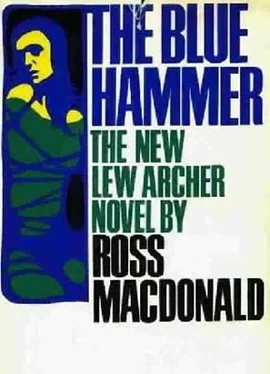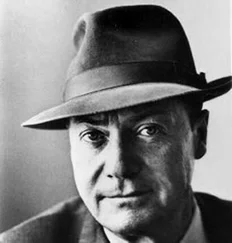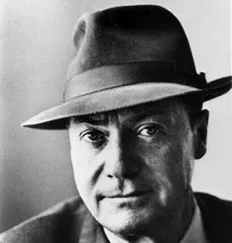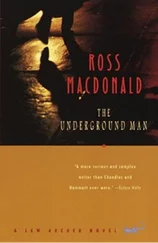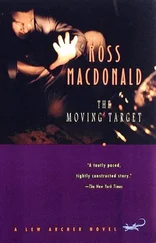"I'm interested in the story of your life."
"I know you are." She turned to Betty. "Why did you have to bring _him_ along? I thought we could have a constructive talk about the future. I thought you and I were good friends."
"I hope we are," Betty said. "But I didn't think I could handle this by myself."
"Handle what? I'm no problem."
But there was a note of terror in Francine Chantry's voice. She sounded like a woman who had stepped off the edge of the world and discovered too late that she could never step back. When we got into my car and entered the freeway, the sense of moving through empty space stayed with me. We seemed to be flying above the rooftops of the tract houses that lined the freeway on both sides.
Betty was driving too fast, but I was content to have her do her stint. She had had some recent sleep; and I wanted a chance to talk to Francine Chantry.
"Speaking of your future," I said, "your husband may be hard to convict."
"My husband?" She sounded confused.
"Richard Chantry alias Gerard or Jerry Johnson. It may not be too easy to pin these murders on him. I gather he isn't talking. And so much of it happened so long ago. I wouldn't be surprised if the prosecutor was willing to make a deal with you. I doubt that he'll want to bring any major charges. Of course that depends on him, and on what you have to offer."
She let out another burst of dry laughter. "My dead body? Would he accept my dead body?"
"He'll want you alive and talking. You know more about this case than anyone."
She was silent for a minute. "If I do, it's not by choice."
"So you were telling me the other night. But you really made your choices long ago. When you dropped William Mead and took up with his half brother Chantry. When you left Arizona with Chantry, even though you must have known that he was a major suspect in the murder of William Mead. Seven years later, you made a final choice, when you decided to cover up the murder of Gerard Johnson."
"Who?"
"Gerard Johnson. The man in the brown suit. It turns out he was a friend of William Mead's. He'd just got out of five years in a veterans' hospital when he came to Santa Teresa to see your husband. I think he had evidence involving Chantry in William Mead's death."
"How?"
"Perhaps William Mead had been threatened by Chantry and they had quarreled over you, or over Mead's pictures, which Chantry stole. And Mead told his army buddy Gerard about it some time before Chantry killed him. When Gerard Johnson turned up in Santa Teresa with William's widow and little boy, it marked the end of Chantry's freedom. He killed Gerard in an effort to stay free, but it only made him more completely unfree. It was a final choice for Chantry as well as you."
"I had no part in the choice," she said.
"You went along with it. You let a man be killed in your house and buried there, and you kept quiet. It was a bad choice for you and your husband. He's been living out its consequences. The murder of Gerard Johnson put him in the hands of William Mead's widow, the woman who calls herself Mrs. Johnson. I don't know why she wanted him. There may have been something between them in the past. Or perhaps the Johnson woman was simply interested in driving a hard primitive bargain with Chantry. He'd killed her husband, now he had to take her husband's place. I don't know why Chantry accepted the bargain, do you?"
Francine Chantry was slow in answering. Finally she said, "I don't know anything about it. I've had no idea that Richard was living in town. I didn't even know if he was alive. I didn't hear from him once in twenty-five years."
"Have you seen him recently?"
"No. I have no desire to see him."
"You're going to have to. They'll be wanting you to identify him. Not that there's much doubt about who he is. He's deteriorated physically and mentally. I think he must have had an emotional breakdown after he murdered Johnson, perhaps before. But he can still paint. His paintings may not be as good as they were, but nobody else could have painted them."
She said with some irony, "Apparently you're an art critic as well as a detective."
"Hardly. But I do have one of his recent paintings in the trunk of my car. And I'm not the only one who thinks that it's a Chantry."
"Are you talking about the painting of Mildred Mead?"
"Yes. I found it this morning in Johnson's attic, where it originated. Where the whole current case originated. That picture seems to be the central thing in the case. Certainly it brought me into it. And it was the painting of it that got Chantry into his present trouble and led him to commit these new murders."
"I don't quite follow that," Francine Chantry said. But she sounded interested, as if this talk of her husband's work had acted on her like a stimulant.
"It's a fairly complex chain of events," I said. "The woman he's been living with on Olive Street-call her Mrs. Johnson-sold the painting to the artist-dealer Jacob Whitmore. That blew Chantry's cover. Whitmore sold the painting to Paul Grimes, and that blew it wider.
"Grimes recognized it as Chantry's work and evidently used the knowledge to blackmail Mrs. Johnson into stealing drugs for him. And he probably demanded more new pictures from Chantry. Grimes had sold the picture of Mildred Mead to Ruth Biemeyer, who had her own reasons for being interested in Mildred. As you probably know, Mildred was Jack Biemeyer's mistress."
"Everybody in Arizona knew it," Francine Chantry said. "What wasn't so generally known was that Ruth Biemeyer had a crush on Richard when they were both young. I think that's the essential reason why she talked Jack into moving to Santa Teresa."
"That's what he says, anyway. It made for a tight family situation which was made still tighter when Mildred Mead came to town. I think Chantry may have seen Mildred some time in the last few months and been moved to paint that memory picture of her."
"I wouldn't know."
"Haven't you seen him recently?"
"No. Certainly not." She didn't look at me. She was peering through the windshield into the broken darkness. "I haven't seen Richard, or heard from him, in twenty-five years. I had no idea that he was living in town."
"Not even when you got a phone call from the woman he was living with?"
"She didn't mention him. She said something about the-the burial in the greenhouse, and she let me know that she needed money. She said if I would help her out she'd go on keeping the whole thing quiet. Otherwise she'd tell the world the real reason for my husband's disappearance."
"Did you give her money?"
"No. I wish now I had. And I very much wish he had never painted that memory portrait of Mildred. You'd almost think he was trying to be found out."
"Perhaps he was, unconsciously," I said. "Certainly Fred was doing his best to find him out. No doubt Fred borrowed the painting from the Biemeyers partly for professional reasons. He wanted to establish whether it really could be a Chantry. But he had personal reasons, too. I think he may have connected it with pictures he had seen in the past in the Johnson house on Olive Street. But he failed to make the final conscious connection between his foster father, Johnson, and the painter Chantry. Before he could do that, Johnson-Chantry took the painting from Fred's bedroom. And the Biemeyers hired me to get it back for them."
Betty tapped the horn. We were moving down the long inland slope behind Camarillo. There were no cars immediately ahead of us. I looked at her and she looked back. She raised her right hand from the wheel and touched her mouth. I got the message. I had talked more than enough, and I subsided.
A few minutes later, Mrs. Chantry said, "It wasn't his first memory picture of Mildred. He painted several others, long ago, in our days together. One of them was a pieta."
Читать дальше
